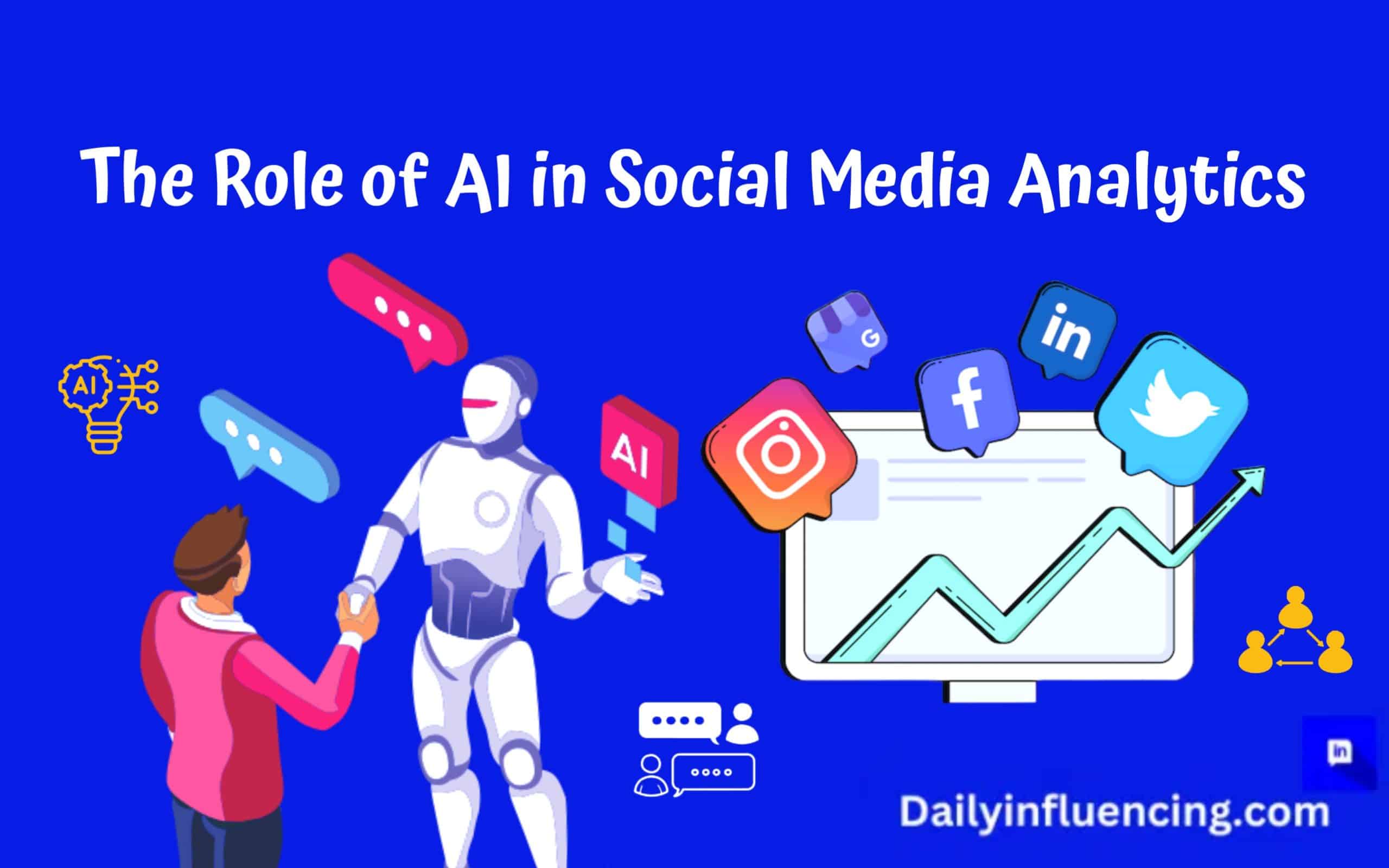
Uncover the role of AI in social media analytics & its benefits for engagement & sentiment tracking insights.
The rapid evolution of social media has transformed the way businesses interact with their audiences. As a result, the vast amounts of data generated by online presence have created a pressing need for effective analysis.
Meanwhile, social media analytics has emerged as a powerful solution, enabling businesses to collect, analyze, and interpret data from social media platforms.
Overview of Social Media Analytics
To begin with, social media analytics involves the use of various tools, techniques, and methodologies to analyze social media data and extract valuable insights. Furthermore, this process encompasses metrics such as engagement rates, follower growth, sentiment analysis, and more.
By leveraging these insights, businesses can gain a deeper understanding of their target audience, identify areas for improvement, and develop data-driven strategies to achieve their marketing goals.
In addition, social media analytics enables businesses to monitor their online reputation. By tracking mentions, sentiment, and engagement, businesses can gain valuable insights into how their audience perceives them. Meanwhile, social media analytics also enables businesses to identify influencers, track hashtags, and analyze competitor activity. By leveraging these insights, businesses can develop targeted marketing strategies that resonate with their audience.
Importance of Social Media Analytics in Business
Notably, social media analytics plays a vital role in today’s competitive business landscape. In fact, businesses that harness the power of social media analytics can improve customer engagement and experience. Also enhance brand reputation and awareness, optimize marketing strategies and campaigns. Identify new business opportunities and trends, and gain a competitive edge in the market.
Brief History of Social Media Analytics
Interestingly, social media analytics has undergone significant transformations since its inception. Initially, businesses tracked basic metrics manually in the early 2000s. Subsequently, social media analytics tools emerged in the mid-2000s, providing basic metrics and insights. Moreover, the 2010s saw the rise of advanced analytics tools and AI-powered platforms, offering deeper insights and predictive analytics.
Understanding Social Media Metrics
To effectively leverage social media analytics, businesses must grasp the various metrics that drive their online presence. Consequently, this section delves into the role of AI in social media analytics, engagement metrics, and sentiment analysis.
The Role of AI in Social Media Analytics: Metrics that Matter
Artificial intelligence (AI) plays a pivotal role in social media analytics, enabling businesses to track and analyze a vast array of metrics. Businesses must focus on metrics that truly matter, such as engagement rates, follower growth, sentiment analysis, and topic modeling. Moreover, AI-powered social media analytics tools enable businesses to track these metrics in real-time, providing timely insights to inform their marketing strategies.
Furthermore, AI-driven analytics help businesses identify patterns and trends in their social media data, enabling them to make data-driven decisions. By actively leveraging these insights, businesses can optimize their marketing strategies, improve customer engagement, and drive business growth.
Engagement Metrics: Likes, Shares, and Comments
Businesses must track engagement metrics to gain a deeper understanding of how their audience interacts with their content. Key engagement metrics include likes, shares, comments, reactions, and hashtag performance. By analyzing these metrics, businesses can identify what resonates with their audience and adjust their content strategy accordingly.
In addition, engagement metrics help businesses identify areas for improvement, optimize their content for better engagement, and develop targeted marketing strategies. By actively leveraging engagement metrics, businesses can boost engagement rates, drive conversions, and achieve their marketing goals.
Understanding Sentiment Analysis in Social Media
Sentiment analysis involves analyzing online conversations, such as social media posts, comments, and reviews, to determine the emotional tone or sentiment behind them. This can be done using natural language processing (NLP) and machine learning algorithms.
Types of sentiment analysis:
- Binary sentiment analysis: Classifies sentiment as either positive or negative.
- Multi-class sentiment analysis: Classifies sentiment into multiple categories, such as positive, negative, and neutral.
- Aspect-based sentiment analysis: Analyzes sentiment towards specific aspects or features of a product or service.
Artificial intelligence (AI) plays a vital role in sentiment analysis, enabling businesses to analyze large volumes of data quickly and accurately. AI-powered sentiment analysis tools can; Analyze test data, Detect Emotions and Provide real-time insights.
The Role of AI in Social Media Analytics: Tracking Engagement
As businesses strive to maximize their online presence, tracking engagement becomes crucial. This section explores how AI transforms social media engagement tracking, enabling businesses to make data-driven decisions.
AI-Driven Strategies for Boosting Engagement
- Personalization: AI algorithms analyze user behavior, enabling businesses to create tailored content that resonates with their audience.
- Content optimization: AI tools assess content performance, providing insights on how to refine and improve future content.
- Influencer identification: AI-powered tools identify influential voices in the industry, allowing businesses to collaborate and expand their reach.
Case Studies: AI-Powered Engagement Tracking in Action
- Coca-Cola: Leveraged AI-driven analytics to monitor engagement across social media platforms, resulting in a 25% increase in brand mentions.
- Nike: Utilized AI-powered tools to track engagement and sentiment analysis, enabling the brand to respond promptly to customer concerns and boost customer satisfaction.
The Impact of AI on Social Media Engagement Rates
AI’s influence on social media engagement rates is multifaceted. By analyzing engagement metrics, businesses can:
- Identify trends: AI algorithms detect patterns in engagement data, enabling businesses to anticipate and adapt to changes.
- Refine content strategies: AI-driven insights inform content creation, ensuring businesses produce relevant and engaging content.
- Enhance customer experiences: AI-powered engagement tracking facilitates prompt responses to customer inquiries, fostering loyalty and trust.
By harnessing AI’s capabilities, businesses can revolutionize their engagement strategies and drive meaningful connections with their audience.
Implementing AI in Social Media Analytics
As social media continues to evolve, businesses must adapt and leverage AI to drive insights and growth. Implementing AI in social media analytics is no longer a luxury, but a necessity. This section provides a comprehensive guide to AI implementation, exploring the challenges, benefits, and best practices for success.
Overcoming Challenges in AI Implementation
While AI offers numerous benefits, its implementation can be hindered by several challenges. To overcome these obstacles, businesses must:
- Address data quality issues: Ensure that social media data is accurate, complete, and consistent to enable effective AI analysis.
- Develop in-house expertise: Provide training and development opportunities for employees to build AI skills and drive successful implementation.
- Integrate AI with existing systems: Collaborate with AI vendors to seamlessly integrate AI solutions with existing social media analytics tools and systems
Leveraging AI for Competitive Advantage
AI can be a game-changer for businesses, providing a competitive edge in the market. By leveraging AI in social media analytics, businesses can:
- Gain deeper customer insights: AI-powered analytics provides a more nuanced understanding of customer behavior, preferences, and needs.
- Enhance customer experiences: AI-driven social media analytics enables businesses to respond promptly to customer inquiries, fostering loyalty and trust.
- Drive business growth: AI-powered insights inform strategic decision-making, driving business growth and revenue.
The Role of AI in Social Media Analytics: Measuring ROI
To measure the return on investment (ROI) of AI in social media analytics, businesses must track key metrics. These include:
- Engagement metrics: Monitor likes, shares, comments, and other engagement metrics to evaluate the impact of AI-driven social media analytics.
- Conversion metrics: Track conversions, such as sales, leads, and sign-ups, to assess the effectiveness of AI-powered social media analytics.
- Cost savings: Calculate the cost savings resulting from AI automation and process efficiencies.
CONCLUSION
Harnessing AI for Smarter Social Media Analytics
As social media continues to evolve, AI will play an increasingly vital role in driving business success. By embracing AI-powered social media analytics, businesses can:
- Stay ahead of the competition: Leverage AI-driven insights to anticipate market trends and stay ahead of the competition.
- Drive business growth: Harness the power of AI to drive engagement, conversions, and revenue.
- Unlock new opportunities: Explore new avenues for growth, innovation, and customer engagement.
By harnessing the power of AI in social media analytics, businesses can unlock new opportunities, drive growth, and succeed in today’s fast-paced digital landscape.




